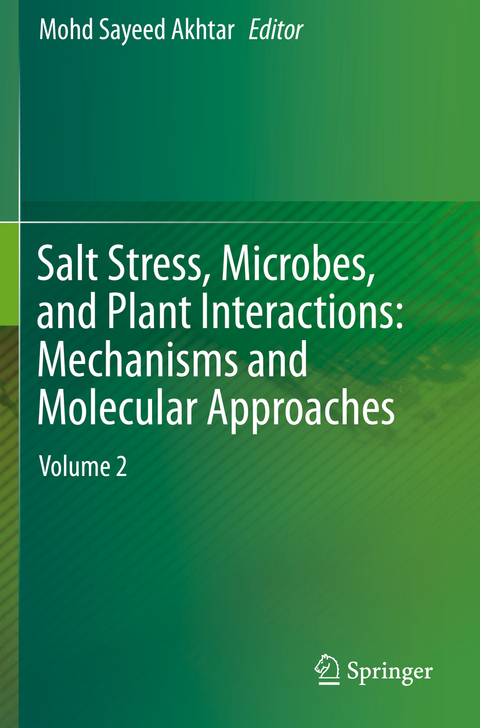
Salt Stress, Microbes, and Plant Interactions: Mechanisms and Molecular Approaches
Springer Verlag, Singapore
978-981-13-8807-1 (ISBN)
This book offers an overview of salt stress, which has a devastating effect on the yields of various agricultural crops around the globe. Excessive salts in soil reduce the availability of water, inhibit metabolic processes, and affect nutrient composition, osmotic balance, and hydraulic conductivity. Plants have developed a number of tolerance mechanisms, such as various compatible solutes, polyamines, reactive oxygen species and antioxidant defense mechanisms, ion transport and compartmentalization of injurious ions. The exploitation of genetic variation, use of plant hormones, mineral nutrients, soil microbe interactions, and other mechanical practices are of prime importance in agriculture, and as such have been the subject of multidisciplinary research.
Covering both theoretical and practical aspects, the book provides essential physiological, ecological, biochemical, environmental and molecular information as well as perspectives for future research. It is a valuable resource for students, teachers and researchers and anyone interested in agronomy, ecology, stress physiology, environmental science, crop science and molecular biology.
Dr. Mohd Sayeed Akhtar (PhD) is working as an Assistant Professor in Gandhi Faiz-e-Aam College, Shahjahanpur, U.P., India. He has received his PhD degree from Aligarh Muslim University (AMU), India in 2008, prior to conducting post-doctoral research at the Botanical Institute, University of Basel (BIB), Switzerland (2008–2010), and Chonbuk National University (CBNU), Republic of Korea in 2011. He was an Assistant Professor, Jimma University, Ethiopia (2011-2014), and a fellow researcher at the Institute of Tropical Agriculture, Universiti Putra Malaysia (UPM), (2014-2015). Dr. Akhtar has more than 15 years of research, and 10 years of teaching experience in soil microbiology, applied microbiology, environmental microbiology, molecular biology, plant pathology and plant nanobiotechnology. He is author and co-author of more than hundred articles in peer-reviewed journals, conference proceedings, and book chapters, and has edited 12 books with international publishers. He is serving the scientific community as editorial board member and reviewer of several high-impact international journals. His current research is focused on the rhizospheric plant-microbe interactions and their molecular biotechnology, bioremediation, biomineralization, nano-fertilizers and nanobiotechnology.
Chapter 1. Microbial management of crop salinity stress: mechanisms, applications and prospects.- Chapter 2. Adaptive Mechanisms of Plants Against Salt Stress and Salt Shock.- Chapter 3. Molecular approaches and salt tolerance mechanisms in leguminous plants.- Chapter 4. Crop improvement through microbial biotechnology: A Crosstalk.- Chapter 5. Role of Phytohormones in Recuperating Salt Stress.- Chapter 6. An enigma in the genetic responses of plants to salt stresses.- Chapter 7. Application of microbial biotechnology in improving Salt stress and crop productivity.- Chapter 8. Consequences of bioinoculants and intercropping approach to alleviate plant drought and salinity stress for sustainable agriculture.- Chapter 9. Role of Signaling Pathways in Improving Salt Stress in Plants.- Chapter 10. Mechanisms and Molecular Approaches for Salt Tolerance Enhancement.- Chapter 11. Crops and Methods to Control Soil Salinity.- Chapter 12. Ameliorating plants salt stress through bacterial inoculation: Prospects and Challenges.- Chapter 13. Proline accumulation and oxidative stress: Diverse roles and mechanism of tolerance and adaptation under salinity stress.
| Erscheinungsdatum | 13.11.2020 |
|---|---|
| Zusatzinfo | 24 Illustrations, color; 11 Illustrations, black and white; XV, 300 p. 35 illus., 24 illus. in color. |
| Verlagsort | Singapore |
| Sprache | englisch |
| Maße | 155 x 235 mm |
| Themenwelt | Naturwissenschaften ► Biologie ► Botanik |
| Naturwissenschaften ► Biologie ► Ökologie / Naturschutz | |
| Naturwissenschaften ► Biologie ► Zellbiologie | |
| Schlagworte | Agro-ecosystem • Microbial Amelioration • Plant metabolisms • Salt stress tolerance • Stress physiology |
| ISBN-10 | 981-13-8807-5 / 9811388075 |
| ISBN-13 | 978-981-13-8807-1 / 9789811388071 |
| Zustand | Neuware |
| Haben Sie eine Frage zum Produkt? |
aus dem Bereich


